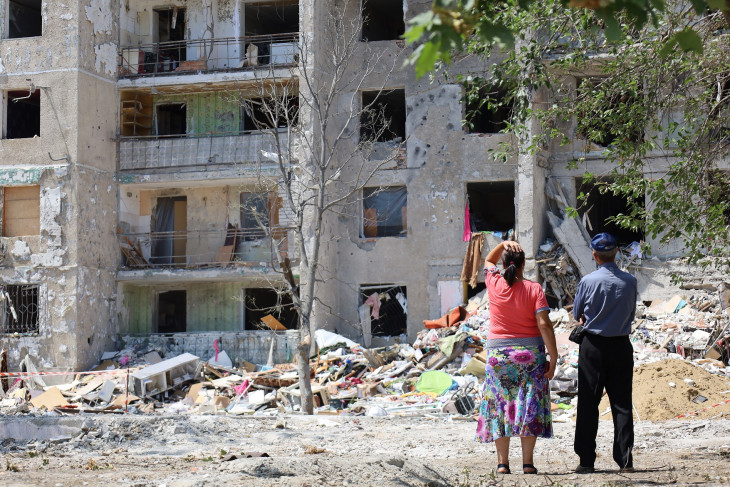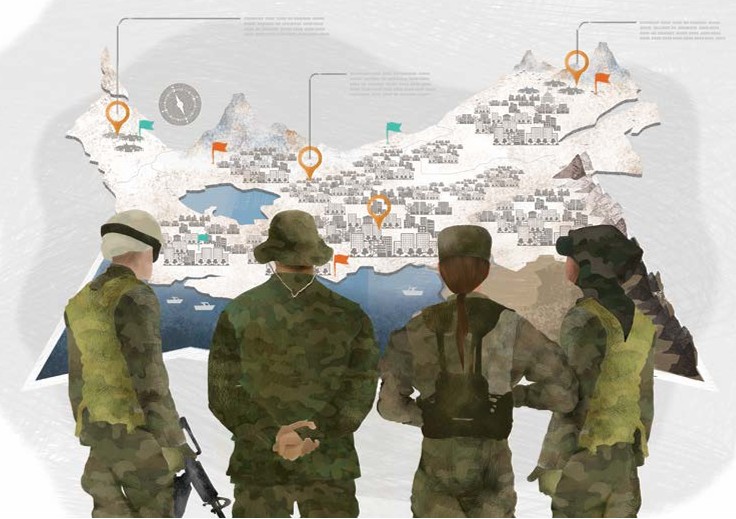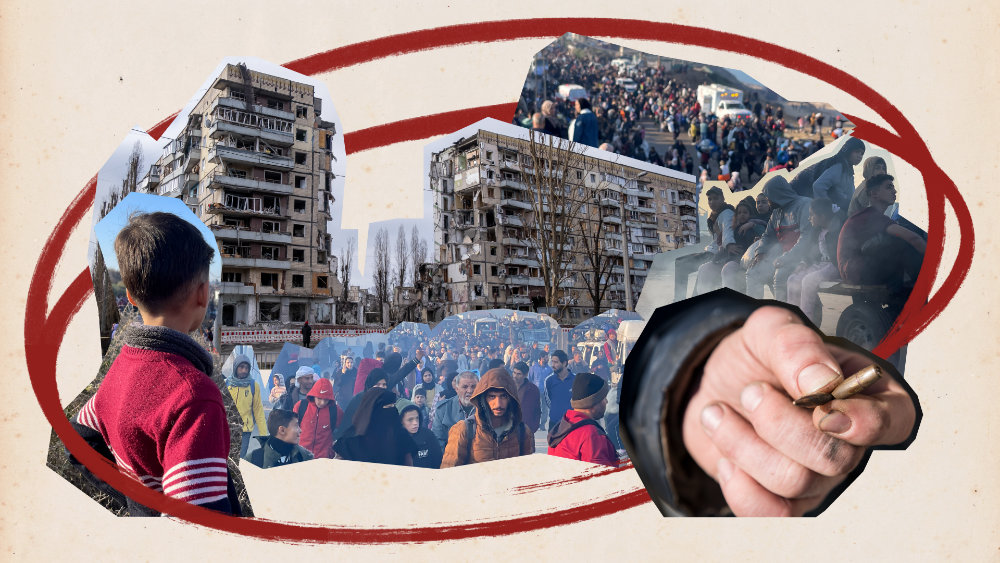In an ever-evolving global landscape, the dynamics of humanitarian work are constantly challenged and shaped by new realities. From acknowledging power imbalances and unconscious biases to embracing the essence of empathy and trust, humanitarians seek to navigate the delicate balance between procedural efficiency and the profound simplicity of human connection.
In this post, David Loquercio, ICRC’s Head of Accountability to Affected People, and Martin Schüepp, ICRC’s Director of Operations, examine the pivotal role of relationships and mindsets in the humanitarian sector, with a focused lens on the ICRC’s people-centric approach. Highlighting the importance of adaptability, multi-level accountability, and a genuine commitment to people-centric values, it prompts readers to reflect on the spirit that underpins the humanitarian movement ahead of a larger discussion due to take place during a learning event on 12-14 September 2023, People-centric humanitarian response in conflict: strategies, insights, and dilemmas.
Over the past two decades, the humanitarian sector has matured and professionalized, adopting quality standards, processes, and new technology to improve support functions and program quality, including staff behavior and community engagement. The milestones for this progress – from the World Humanitarian Summit and the signing of the Grand Bargain in 2016 to OCHA’s more recent flagship initiative to pilot locally driven coordination structures – were all grounded in humanitarian organizations’ willingness to improve, account for donor expectations and streamline the efficiency and effectiveness of humanitarian action. The ICRC has echoed these efforts, working towards solutions adapted to its own mandate and fundamental principles.
While these initiatives unfolded in a context of increasing needs and funding[1], today’s financial shortfalls and constrained budgetary landscape further stretch capacities, against the backdrop of the increasingly visible and exacerbating impact of climate change.
The ICRC, the Red Cross Red Crescent Movement, and the broader humanitarian sector have an important responsibility moving forward. Any budget cuts and reductions in programs implicate a painful process, first and foremost for people affected by conflict whose needs go unmet, but also for humanitarian staff who lose their livelihoods. We cannot content ourselves by simply optimizing what we do – we need to dig deeper and ask ourselves: Have our professionalization efforts these past decades paid off, including our repeated commitment to put “people at the center? Rethinking what we do and how we do it can only be relevant in relation to the people who give legitimacy to our mandate.
Put another way, as in a statement by the Principals of the Inter-Agency Standing Committee (IASC), “[a]s humanitarians, our primary responsibility is to people affected by crisis. They are the sole reason our institutions and programmes exist. How communities experience and perceive our work is the most relevant measure of our performance.”
The unintended impact of professionalization efforts
First, we should acknowledge that a significant part of the sector’s evolution over the past two decades has been reactive, driven by donor demands and broader societal shifts, from gender equality to popular movements like #MeToo and Black Lives Matter. Consequently, the humanitarian framework has expanded organically, often producing an overwhelming array of policies, strategies, and tools. Unless field operatives have a clear compass with which to navigate this complex web of demands, they can become bogged down by the sheer volume of expectations and risk drifting into indifference or cynicism.
The quest for enhanced professional standards in the humanitarian sector has inadvertently added complex processes and increased administrative burdens onto the roles of aid workers, especially managers. The unintended impact of this is a higher cost of doing business and reduced time spent in proximity to people affected by conflict, already challenged by security and access restrictions. This double-bind scenario escalates even further when resources are strained, posing a challenge in implementing our nuanced commitments to an accountable, inclusive, and more sustainable humanitarian response.
We need to strike the right balance and hierarchy between people, principles, and processes so that the latter remains at the service of the former. People, encapsulating the very essence of humanity, form the foundation of the humanitarian mission. Principles, our ethical compass, dictate the direction and manner of our endeavors. Processes, while instrumental, are only the tools designed to transform intent into action.
People at the forefront: the ICRC’s approach
The ICRC, in striving to become increasingly people-centric and accountable, has anchored its commitment into a strategically designed approach. Despite financial constraints, our dedication to placing people at the forefront remains solid. Based on a theory of change, it encompasses six pivotal areas, prioritizing the needs of affected individuals over donor expectations, but working to meet these as well.
1. Standards:
Instead of a boilerplate adoption of the Core Humanitarian Standard, the ICRC used it as a springboard to foster internal discussions, design its own framework, and generate a sense of collective ownership. We subsequently adopted an approach, integrating aspects like inclusive programming and disability inclusion, to facilitate a more holistic approach for staff as a framework for both quality and accountability. The connection of these elements to the principle of impartiality in particular helped to ensure guidelines resonate with teams at delegation level.
2. Communication:
For change to be effective, it must first and foremost make sense to those implementing it. For the ICRC, being accountable to the affected population is not only an ethical imperative, but it also enhances the impact of our work, enriching staff motivation and bolstering our credibility with people, donors, and local authorities. As part of that, recognizing ethical dilemmas, documenting them, and being appropriately transparent in our decision-making process is essential.
3. Evidence and accountability:
The ICRC places emphasis on transforming standards into actionable plans, tracking progress through Accountability to Affected People (AAP) self-assessments, monitoring, and regular evaluations. This evidence-based approach helps to refine strategies, ensuring they remain relevant and beneficial. Our goal is to provide evidence and insights that genuinely support managerial decision-making, rather than merely ticking off reporting boxes.
4. Staff capacity:
Equipping all operational staff with knowledge about AAP is vital because as ALNAP suggests, over-professionalizing can isolate AAP into a specialized niche.[2] Our aim is to integrate AAP seamlessly into our operations without making it seem like an arduous addition that is more complex than it needs to be.
5. Mainstreaming:
This is why the ICRC stresses the integration of AAP across various operational levels. For a sustainable, holistic people-centric endeavor, it’s imperative that institutional-level AAP principles are translated to resonate within each of our programs and at every stage of our operation[3]. For example, adapting technical standards to preferences may have very different consequences for medical programs than it would for the re-establishment of family links, just like the appropriate way of sharing information will differ between detention and physical rehabilitation. Here, colleague testimonials and program-specific case studies often wield more influence than the voices of AAP staff.
6. Adapting systems and processes:
This last dimension looks at how we can adapt the systems that underpin our operations to better support our staff in pursuing our people-centric mandate. Transformations – such as the transition of organizing plans towards outcomes and the corresponding revision of our program cycle, the integration of data disaggregation in our data management frameworks, or the development of a set of institutional values that echo those found in the AAP framework – illustrate this effort. Process improvement is part of this as well; technology can, for example, improve response times for people providing feedback. Now active in more than 15 countries, Community Contact Centers allow us to provide an immediate response to the overwhelming majority of callers.
How can the ICRC and other humanitarian actors take these efforts a step further? In our view, this should be a combination of carefully optimizing internal processes so as to support outcomes that are meaningful to people affected by conflict, all while being guided by the fundamental principles of the International Red Cross and Red Crescent Movement.
How to deliver on a people-centric agenda
While processes offer structure and efficiency, they should remain in service to our mission and be guided by the fundamental principles. If not, they will only distance staff from meaningful fieldwork and erode empathy. Here are three things we can do in relation to this.
First, we should acknowledge the organic and at times disorganized growth that has taken place in recent years, reassess what we want to achieve, and then redesign a deliberate, holistic ecosystem of processes and responsibilities. This redesigned structure should resonate with our mission, include people affected by conflict as key stakeholders across the program cycle, and add value to staff. Reporting and compliance are important, but they should not be the main drivers of this redesigned system.
Secondly, the humanitarian sector, with its yearly objectives and budgetary timelines, tends to favor outputs over outcomes. From a policy and process standpoint, we should question whether the fast-paced production of strategies, policies, and other guidance has taken precedence over their application. Slowing down production and focusing on implementation may not only foster more tangible results but also result in a healthier relationship between policy and practice. Part of this shift requires simplifying policy language and prioritizing practice over debates on terminology.[4]
Finally, our commitment to engaging constructively with communities must also be reflected in our internal staff interactions, in order to credibly and truly reflect such values as timely information sharing, acting on feedback, inclusive decision-making, and genuine attention to diversity.[5]
More importantly, delivering on the people-centric agenda is also about power and mindset. Acknowledging unequal power relations, the reality of unconscious bias, and being open about the difficult choices ethical dilemmas confront us with is central to tackling larger questions, including what incentives need to change and how, the balance between accountability at project and macro levels, and ultimately making sure the sector remains fit for purpose.
Acknowledge power and unconscious bias
At the heart of our commitment to affected people is the understanding that we inherently hold power and influence during crises. This position, often exacerbated by unconscious biases – shaped by societal norms, values, and prejudices – requires intentional reflection and action by all within our organization. Rather than merely acknowledging these biases, we must actively decide how we create space for those affected. Simple tools like the Power Walk exercise can enhance our awareness and responsiveness to the diversity of lived experiences within humanitarian contexts.
Embrace complexity, but aim for informed choices
The ever-shifting humanitarian landscape, particularly in conflict settings, is inherently complex and unpredictable. Challenges, ranging from security threats and intricate political dynamics to fragmented social structures, can sometimes create barriers in our application of people-centric principles. Restricted access to affected groups, changing conflict boundaries, and heightened mistrust towards outsiders are but a few obstacles that add layers of complexity. Climate change, migration, poverty, and other global challenges further complicate this scenario and widen the gap between needs and resources.
In such circumstances, there is never just one correct way to balance the resources, needs, and our mandate; instead, there is a never-ending list of dilemmas and choices. Recognizing the unpredictable nature of our environment, we must understand that striving for the perfect response might not always align with the dynamic demands of humanitarian work. Instead, our approach should be rooted in posing relevant questions, drawing from our expertise, and being willing to adapt based on what people and our partners tell us about the changing needs on the ground.
Humanitarian decisions are seldom clear-cut. They are about navigating between competing priorities. Here, in the spirit of a people-centric response, it could seem logical to discuss with people affected about their priorities when financial constraints require making choices, but shifting the responsibility towards the community could also impact social cohesion and receive criticism from an ethical standpoint.[6] In the face of these intricacies, our dual approach, combining confidence drawn from our expertise with the humility to recognize our own limits, is the only way to ensure that our interventions are not only tailored to the evolving landscape but also remain deeply empathetic and effective.
Accountability beyond compliance
Our sector’s focus has often been on project-level compliance. But accountability should also include questions about what crises get funded or not[7],[8] and the degree to which a humanitarian response (or its absence) can be justified in relation to humanitarian principles.
Adjust incentives
To shift towards a people-centric approach, our metrics and associated incentives must evolve. While financial outcomes remain important, we ought to put a deeper emphasis on the quality of our interventions as perceived by people, as well as their experience with us, with a more nuanced understanding of differences between groups. Data disaggregation can play a central role here by telling us who might be missing and whether different groups have different experiences with us. In doing so, it’s of course essential to navigate the delicate balance between capturing detailed information and ensuring data privacy.
Likewise, feedback from the communities we work with should be more than just a footnote in our reports. Their insights can drive real improvements in our work, resulting in more relevant, effective, and responsive interventions, something that also increases staff engagement. By aligning our incentives with the principles of quality, inclusivity, and staff fulfillment, we are better positioned to serve affected communities and keep our teams engaged and motivated.
Maintain relevance
Our era presents a myriad of challenges, from the complexities of digital warfare to the multi-faceted impact brought about by climate change. The expectations of those we serve have transformed and it’s no longer considered enough to merely ensure survival in protracted crises[9].
Historically, the humanitarian movement charted an innovative course in shaping global responses to human distress. However, today, even progressive agendas like the “Participation Revolution” seem constrained, focusing primarily on including affected individuals within existing, internationally-led programs.
Addressing contemporary challenges requires both fidelity to our foundational principles and values as well as a readiness to reshape our methods, ensuring international humanitarian law and humanitarian principles remain a bedrock and dynamic force in alleviating human suffering.
For example, as aid agencies reduce international travel, whether to shrink their carbon footprint or adapt to travel restrictions such as COVID-19, responsibility on the ground will increasingly be shouldered by resident staff and local organizations. As the necessity of meaningful, equal partnerships with like-minded organizations further increases[10], it demands an honest reflection on power dynamics, advocating for true collaboration.
Beyond mandates and policies: empathy and trust as foundations
Against the backdrop of complex and evolving humanitarian challenges, the true essence of the ICRC’s and other humanitarian organizations’ work must remain anchored in human connection. Beyond mandates and policies, our impact is best inspired by genuine empathy and dedication to those we serve. It must however be backed up with reliability, professionalism, independence, and impartiality in order to develop genuine trust. In this equation, our pursuit of a people-centric humanitarian response hinges on our willingness and capacity to maintain proximity with and remain accessible to communities affected by conflict [11].
[1] According to the Global Humanitarian Assistance Report 2022 (devinit.org) UN coordinated appeals attracted 21.4 billion USD in 2021 as opposed to just 6.4 billion USD in 2012, but with unmet requirements increasing from 4.1 billion USD to 16.9 billion USD in the same period.
[2] Doherty, J. From tick box to turning point: getting accountability right for improved humanitarian action, ALNAP, upcoming
[3] Advice also found in the Humanitarian Accountability Report 2022, CHS Alliance, p22.
[4] Doherty, J., p. 18, upcoming, also implies the humanitarian sector should move away from specialists, who often don’t have the authority to adapt programs themselves.
[5] This is a recommendation similar to that found in the Humanitarian Accountability Report 2022, CHS Alliance, p.10
[6] Doherty, J. From tick box to turning point: getting accountability right for improved humanitarian action, ALNAP, upcoming p. 26
[7] James Darcy already made the argument that the sector overemphasizes micro over macro accountability in 2013: Darcy, J. (2013) Have we lost the plot? Revisiting the accountability debate; 2013 Humanitarian Accountability Report, HAP
[8] Doherty, J. From tick box to turning point: getting accountability right for improved humanitarian action, ALNAP, upcoming (p25)
[9] De Geoffroy, V., Knox Clarke P., Bhatt, M., and Grunewald, F. with Doherty, J. (2021) ALNAP Lessons Paper: Adapting humanitarian action to the effects of climate change. London: ALNAP/ODI
[10] Building on the strengths of respective partners, as suggested in Chapter 5 of the Humanitarian Accountability Report 2022
[11] « …proximity is a driver of accountability and a prerequisite of effectiveness and relevance.” Argues Labbé, J., How do humanitarian principles support humanitarian effectiveness, in Humanitarian Accountability Report 2015 (On the road to Istanbul: how can the world humanitarian summit make humanitarian response more effective ? )
See also:
- Colin Walch, “Supporting social protection: five considerations for a principled humanitarian approach”, June 8, 2023
- Hugo Slim, “People power in humanitarian action”, February 20, 2020
- Tina Bouffet, “Everything you always wanted to know about engagement and accountability … (but were afraid to ask)”, April 17, 2018







Comments